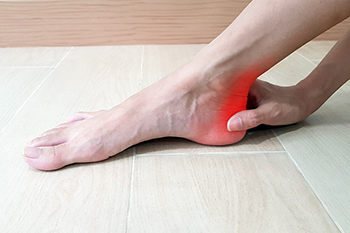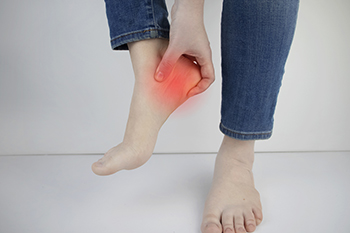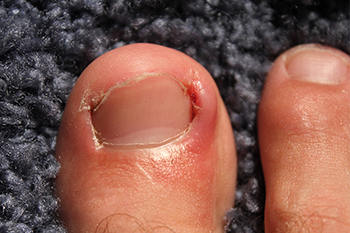Oceanside (760) 630-9200
March 2023
Relief Options for Foot Pain During Pregnancy

Foot pain can be common during pregnancy. This can be a result of the added weight the feet must bear from the developing fetus, and may gradually worsen until the baby is born. Hormonal changes may cause the ligaments in the body to become loose, and this often applies to the feet. Some women have to alter their gait or walking style to accommodate the growing baby, and may walk on the outside of their feet during the third trimester. Plantar fasciitis is often experienced during pregnancy, which can happen if the plantar fascia becomes inflamed. This is the band of tissue that connects the heel to the toes, and may become irritated from the added weight. The Achilles tendon is located in the back of the lower leg, and connects the calf muscles to the heel. Tendonitis can occur if it becomes inflamed while walking, and cause pressure on the heels. Pregnant women have found mild relief from foot pain during this time by performing foot stretches, soaking their feet in warm water, or wearing orthotic insoles. If your pregnancy is causing your feet to hurt, it is suggested that you seek the counsel of a podiatrist who can offer you helpful relief options.
Pregnant women with swollen feet can be treated with a variety of different methods that are readily available. For more information about other cures for swollen feet during pregnancy, consult with Dr. Jeff Brooks from Oceanside Foot & Ankle Center. Our doctor will attend to all of your foot and ankle needs.
What Foot Problems Can Arise During Pregnancy?
One problem that can occur is overpronation, which occurs when the arch of the foot flattens and tends to roll inward. This can cause pain and discomfort in your heels while you’re walking or even just standing up, trying to support your baby.
Another problem is edema, or swelling in the extremities. This often affects the feet during pregnancy but tends to occur in the later stages.
How Can I Keep My Feet Healthy During Pregnancy?
- Wearing orthotics can provide extra support for the feet and help distribute weight evenly
- Minimize the amount of time spent walking barefoot
- Wear shoes with good arch support
- Wear shoes that allow for good circulation to the feet
- Elevate feet if you experience swelling
- Massage your feet
- Get regular, light exercise, such as walking, to promote blood circulation to the feet
If you have any questions please feel free to contact our office located in Oceanside, CA . We offer the newest diagnostic and treatment technologies for all your foot and ankle needs.
Are You Suffering From Ingrown Toenails?
How Did I Injure My Achilles Tendon?

An Achilles tendon injury can cause extreme pain and discomfort. This tendon is located in the lower back of the leg, and connects the heel to the calf muscles. People who enjoy running may experience Achilles tendon injuries. This may be a result of increasing speed and mileage too quickly, and not warming up and cooling down properly before and after running. The pain is immediately felt when this type of injury has happened, and additional symptoms can include decreased strength, stiffness in the back of the heel, and it can be difficult to walk. A proper diagnosis is often done, which consists of having an X-ray, MRI, or ultrasound performed. This often begins with resting the affected foot as frequently as possible, and keeping the weight off of it. It may be beneficial to perform strength training exercises and stretches as it heals, in addition to wearing custom-made orthotics. If you have an Achilles tendon injury, it is strongly suggested that you are under the care of a podiatrist who can properly treat this condition.
Achilles tendon injuries need immediate attention to avoid future complications. If you have any concerns, contact Dr. Jeff Brooks of Oceanside Foot & Ankle Center. Our doctor can provide the care you need to keep you pain-free and on your feet.
What Is the Achilles Tendon?
The Achilles tendon is a tendon that connects the lower leg muscles and calf to the heel of the foot. It is the strongest tendon in the human body and is essential for making movement possible. Because this tendon is such an integral part of the body, any injuries to it can create immense difficulties and should immediately be presented to a doctor.
What Are the Symptoms of an Achilles Tendon Injury?
There are various types of injuries that can affect the Achilles tendon. The two most common injuries are Achilles tendinitis and ruptures of the tendon.
Achilles Tendinitis Symptoms
- Inflammation
- Dull to severe pain
- Increased blood flow to the tendon
- Thickening of the tendon
Rupture Symptoms
- Extreme pain and swelling in the foot
- Total immobility
Treatment and Prevention
Achilles tendon injuries are diagnosed by a thorough physical evaluation, which can include an MRI. Treatment involves rest, physical therapy, and in some cases, surgery. However, various preventative measures can be taken to avoid these injuries, such as:
- Thorough stretching of the tendon before and after exercise
- Strengthening exercises like calf raises, squats, leg curls, leg extensions, leg raises, lunges, and leg presses
If you have any questions please feel free to contact our office located in Oceanside, CA . We offer the newest diagnostic tools and technology to treat your foot and ankle needs.
Reminder: When Was the Last Time...?
What Is Plantar Fasciitis?

The pain from the foot condition known as plantar fasciitis can be debilitating. This ailment is caused by an inflamed plantar fascia, which is the band of tissue that is found on the soles of the feet. The plantar fascia connects the heel to the toes and may become torn from standing on hard surfaces all day or wearing shoes that lack adequate arch support. Additionally, there may be existing medical conditions such as obesity, abnormal foot structure, or naturally tight calves that may lead to plantar fasciitis. The heel pain associated may be worse in the morning upon arising, or after sitting for a long period. Mild relief may begin with wearing shoes that fit correctly as well as stretches that target the plantar fascia. If you are afflicted with plantar fasciitis, it is suggested that you consult with a podiatrist who can determine the best course of treatment for you.
Plantar fasciitis is a common foot condition that is often caused by a strain injury. If you are experiencing heel pain or symptoms of plantar fasciitis, contact Dr. Jeff Brooks from Oceanside Foot & Ankle Center. Our doctor can provide the care you need to keep you pain-free and on your feet.
What Is Plantar Fasciitis?
Plantar fasciitis is one of the most common causes of heel pain. The plantar fascia is a ligament that connects your heel to the front of your foot. When this ligament becomes inflamed, plantar fasciitis is the result. If you have plantar fasciitis you will have a stabbing pain that usually occurs with your first steps in the morning. As the day progresses and you walk around more, this pain will start to disappear, but it will return after long periods of standing or sitting.
What Causes Plantar Fasciitis?
- Excessive running
- Having high arches in your feet
- Other foot issues such as flat feet
- Pregnancy (due to the sudden weight gain)
- Being on your feet very often
There are some risk factors that may make you more likely to develop plantar fasciitis compared to others. The condition most commonly affects adults between the ages of 40 and 60. It also tends to affect people who are obese because the extra pounds result in extra stress being placed on the plantar fascia.
Prevention
- Take good care of your feet – Wear shoes that have good arch support and heel cushioning.
- Maintain a healthy weight
- If you are a runner, alternate running with other sports that won’t cause heel pain
There are a variety of treatment options available for plantar fasciitis along with the pain that accompanies it. Additionally, physical therapy is a very important component in the treatment process. It is important that you meet with your podiatrist to determine which treatment option is best for you.
If you have any questions, please feel free to contact our office located in Oceanside, CA . We offer the newest diagnostic and treatment technologies for all your foot care needs.
Why Live with Pain and Numbness in Your Feet?
Causes and Symptoms of an Ingrown Toenail

There is no mistaking the pain from an ingrown toenail. The big toe is typically affected, and it can be difficult to wear shoes. An ingrown toenail can develop when it grows into the skin instead of over it, and the pain can cause prompt medical attention to be sought. Symptoms that are associated with an ingrown toenail can include severe tenderness, swelling, and the toe may become red. The most common reason to develop this ailment is from wearing shoes that are too tight, followed by trimming the nails incorrectly. Additionally, it may happen from a toe injury, or if the nails are naturally curved. Soaking the affected foot in warm water may temporarily bring mild relief. This often makes it easier to push the nail away from the skin using a piece of cotton. Ingrown toenails can become infected. It is suggested that you consult with a podiatrist who can effectively treat this condition before it becomes more serious.
Ingrown toenails may initially present themselves as a minor discomfort, but they may progress into an infection in the skin without proper treatment. For more information about ingrown toenails, contact Dr. Jeff Brooks of Oceanside Foot & Ankle Center. Our doctor can provide the care you need to keep you pain-free and on your feet.
Ingrown Toenails
Ingrown toenails are caused when the corner or side of a toenail grows into the soft flesh surrounding it. They often result in redness, swelling, pain, and in some cases, infection. This condition typically affects the big toe and may recur if it is not treated properly.
Causes
- Improper toenail trimming
- Genetics
- Improper shoe fitting
- Injury from pedicures or nail picking
- Abnormal gait
- Poor hygiene
You are more likely to develop an ingrown toenail if you are obese, have diabetes, arthritis, or have any fungal infection in your nails. Additionally, people who have foot or toe deformities are at a higher risk of developing an ingrown toenail.
Symptoms
Some symptoms of ingrown toenails are redness, swelling, and pain. In rare cases, there may be a yellowish drainage coming from the nail.
Treatment
Ignoring an ingrown toenail can have serious complications. Infections of the nail border can progress to a deeper soft-tissue infection, which can then turn into a bone infection. You should always speak with your podiatrist if you suspect you have an ingrown toenail, especially if you have diabetes or poor circulation.
If you have any questions, please feel free to contact our office located in Oceanside, CA . We offer the newest diagnostic and treatment technologies for all your foot care needs.









